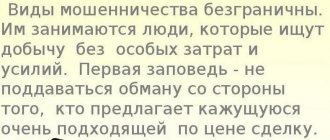In the modern world, transferring to one or another bank card or account is probably no longer difficult for anyone, being an established and familiar matter. However, even with all the care and responsible approach to such financial transactions, none of us is immune from mistakes: it is enough to enter just one character incorrectly and your transfer will go to someone else’s card. What can you do to ensure that the money returns, if not to you, then at least to the card owner to whom it was intended? And what should you do if the funds were transferred quite deliberately, but it later turned out that you were dealing with scammers? Together with FAN , lawyer Ekaterina Antonova (https://www.instagram.com/advokat_antonova_krd/), we’ll figure out how to behave in such situations.
Does it make sense to ask the cardholder to return funds accidentally transferred to him?
Trying to come to a humane agreement with someone who has the good fortune of suddenly receiving “material assistance” is, perhaps, the first thing that comes to mind for someone who has discovered a mistake and is wondering for the first time how to return money transferred to the wrong place . You can do the following: send, for example, 1 ruble to the same card (account or mobile phone number), and in the comments to the transfer briefly explain that you mixed up the account number, and also indicate your phone number so that the card holder I could call you back. Most often, this is exactly what people do, because a normal, adequate citizen, as they say, does not need someone else’s goods, therefore, having tried your situation on himself, he will most likely show up and return the transfer.
Punishment for online fraud
Responsibility for fraud (including fraud on the Internet) is provided for in Art. 159 of the Criminal Code of the Russian Federation. The sanction of this article establishes the following types of punishment:
- a fine of up to 120 thousand rubles;
- a fine in the amount of the salary or other income of the convicted person received by him for a period not exceeding one year;
- compulsory work lasting up to 360 hours;
- correctional labor for up to 1 year;
- restriction of freedom/forced labor for up to 2 years;
- arrest for up to 4 months;
- imprisonment for up to 2 years.
Thus, the punishment for fraud on the Internet is not severe enough, even taking into account the legislator’s differentiated approach to its possible types.
What should you do if you have not received a response when you contact the cardholder?
How to return money transferred to a Sberbank or any other bank card if the recipient turned out to be dishonest - did not return the money transfer and did not even call back? In such a situation, you need to immediately personally contact the nearest branch of the bank of which you are a client and write a statement. This action, by the way, can be taken simultaneously with an attempt to negotiate with the subscriber directly.
“Even if a person transferred money to the wrong place, it will not be returned immediately. First, the bank will send an official notification to the citizen to whom the money transfer was made in error. It will contain a request to return the money to the rightful owner. The bank will not provide you with the personal data of this citizen, since this is a bank secret,” clarifies Ekaterina Antonova.
pixabay.com/
The application will have to be drawn up in two copies: the first of them with the bank’s mark will be given to you, and the second will remain in the bank. Be sure to make sure that the application reflects the date of its acceptance and also has the signature of a bank employee. The bank representative must then contact the owner of the account into which your funds were received and inform him that the transfer was made in error. Keep a copy of the application as the apple of your eye - in case the recipient of your money turns out to be fundamentally unscrupulous.
Experts explain what unexpected money in your account can do
If you received money on your card from someone unknown, then with a 99% probability you are dealing with scammers or organizations to whom they gave your passport details to conclude a loan agreement, lawyers and representatives of financial organizations told Gazeta.Ru.
“Translated by mistake, return it!”
The most important advice that lawyers give in case of an unexpected increase in the account is not to spend this money, because it will have to be returned later in any case.
“Black month” for American stocks: is it worth buying before autumn?
According to analysts’ forecasts, in the near future the American stock exchange will decline due to the season...
08 August 13:54
If you're lucky, your account was replenished due to an honest mistake, for example, in the phone number used for the transaction. In this case, you will most likely receive a call from the sender shortly after the transfer. Advise the person who sent the allegedly erroneous transfer to contact their bank with a request for a refund, says Andrey Shugaev, deputy chairman of MCA Klishin and Partners.
“At the same time, the citizen who received the money, in turn, also needs to call his bank and report that he received an unknown transfer. And then write an application for a refund of the money that was credited erroneously,” says the lawyer. In this case, you will be clear before the law and minimize risks.
Under no circumstances should you make a return yourself.
This is how scammers often work: you “returned” the money to the account they indicated, and five minutes later the real sender calls you and states that he doesn’t know the first person at all, and you transferred the money to an unknown location. In this case, the sender’s demands may well be supported by the court, warns Vice-President of the Association of Russian Banks Alexey Voylukov. Therefore, if it is unclear where money appears in your account, you need to contact your bank.
“Banks do not have a legal obligation to return transfers to senders at the request of the recipient, but most banks do this at the request of the client,” Alexey Voylukov explained to Gazeta.Ru.
One of the difficulties that recipients of unexpected money face is that it is not always possible to trace the source. Sometimes an extended account statement or payment document helps; the bank will issue them upon request, although in some cases for an additional fee, says Voylukov.
However, as one of the largest banks in Russia explained to Gazeta.Ru, financial institutions will not always have the details of the person who made the transfer. This is possible if the transaction was transferred not through a payment order, but through some payment services, for example, the fast payment system (FPS). The operator of such a service or system (in the case of SBP this is NSPC) can provide this information to law enforcement agencies or at the request of a court, but certainly not to an ordinary citizen.
Sometimes a sender who appears on your horizon after some time may demand a percentage “for using the money” while it was in your account. Lawyers remind you that the loan interest can be determined by the lender only if you have signed an agreement with him.
“If there is no agreement between you, then you must return the money with a percentage determined by law. That is, if you returned the money within a matter of days, then the amount of interest under Article 395 of the Civil Code of the Russian Federation will be extremely insignificant (about 9 rubles per day from an amount of 50 thousand rubles),” says Igor Serkin, head of the dispute resolution practice at the law firm Cliff.
But as a rule, “gifts” in the form of cash do not fall into citizens’ accounts just like that. Small banks, microfinance organizations (MFIs) or illegal lenders may be behind the transfer. They may have loan agreements in their hands, which the recipient allegedly took, obliging to pay from 1 to 3% per day of the loan amount.
If, during a dispute, collectors or microfinance organizations claim that an agreement was concluded between you, then you need to become more active - at least contact a qualified lawyer.
“It is not enough to simply say that the agreement was not signed. If there is an agreement that was not signed by you, then this is the basis for a statement about falsification of evidence if the case is in court, and for a statement to the police in any other case,” Serkin emphasizes.
There is also no need to succumb to panic and pressure from such creditors, just as there is no need to pay them interest.
It is necessary to record all communications and write official appeals - to the bank, to the police and to the company that allegedly issued the loan. You can also contact the Central Bank, as the supervisory authority for financial organizations, with a complaint about calls about obtaining a microloan without your knowledge and ask the regulator to conduct an inspection.
If the guilt of microfinance organizations, and not third parties, is proven, such companies will face sanctions from self-regulatory organizations and the Bank of Russia - from fines to exclusion from registers (meaning the further impossibility of conducting microfinance activities), says Elena, director of SRO "MiR". Stratieva.
If you receive calls from collectors, you may need to contact the Federal Bailiff Service, which supervises them, advises Voylukov. In case of threats, you can also complain to law enforcement agencies with a corresponding statement about attempts at extortion, recalls Andrey Shugaev.
“I emphasize once again that you should not “repay” debt and interest for using other people’s money yourself. This will only benefit the scammers,” says Shugaev.
MFOs are not always guilty by definition
As Stratieva reminds, microfinance organizations can also become victims of fraudsters - for example, they can receive fake documents using a leaked database. Just two weeks ago, documents with personal data of bank clients were found
at a landfill in Pyatigorsk.
“Without knowledge of passport data in detail, such agreements are not required in terms of refunds, which means that theft or sale of personal data of consumers of financial services can also take place here. Also, without knowing the full details of the borrowers, transferring to the account is technologically impossible. Yes, it is possible to transfer to a card using a phone number, but only a few microfinance organizations make transfers to individuals using phone numbers, not card numbers,” says Stratieva. That is, in fact, the situation may be much broader and more complex.
Unfortunately, it is impossible to completely insure against any type of unfair practices. Especially when dealing with those that may be based on the theft and sale of personal data. Here there can only be one piece of advice - carefully monitor where and when you leave them, whether you are asked to sign consent to the processing of personal data, if they require it from you, under what conditions, she summarizes.
In what cases should you contact the police?
It should be remembered that even a bank employee does not have the right to force the recipient to return funds to you if you discover that you transferred them to fraudsters. He can only ask the recipient about it. How can you return the money transferred to the card if the bank informed you that the account owner was found, but the funds never arrived? According to the law, such situations are regulated by Article 1102 of the Civil Code of the Russian Federation “Obligation to return unjust enrichment.” Or in some cases - an article about fraud. Therefore, in order to defend your rights, feel free to contact the police, and this is where a copy of the statement written at the bank will come in handy.
Next, we again have two options for the development of events, the expert explains. In the first of them, the police refuse to initiate criminal proceedings. You will receive an official notification of refusal by mail at your place of actual residence (or the place where you contacted the police).
pixabay.com/
The second option is to initiate a criminal case. In practice, this happens very rarely and, as a rule, under special circumstances - for example, when there are several victims. Or if the person appearing in your application has been transferred money by mistake more than once and he never returned it. In this case, the recipient's actions may be regarded as fraudulent.
“Scammers just called you”
There's a multi-way here. First, the potential victim receives a call from an obvious scammer who is easy to ignore. And then a bank employee or police officer contacts her. He says that he recorded the intruder's call, and this needs to be dealt with. During the process, he will ask you to provide card details, or transfer money to special accounts, or apply for a loan - options are possible.
How to protect your money
Unless you are a character from the series “Trace,” which is known for its fantasies about high-tech law enforcement, the situation described is unlikely. Let's say an operative eavesdropped on your conversation (which in itself is much more suspicious than a call from an attacker) and spotted a potential criminal. But he didn’t steal anything from you - how can you be useful to the investigation? The scheme does not stand up to the test of reality, just hang up and forget about it.
Is it possible to return the transferred money if the police did not help?
The initiation of a criminal case is the basis for going to court. However, even if a refusal is received, you also have the right to turn to Themis for help.
“If all of the above actions do not bring results and the citizen ignores the return of funds, then you can go to court with a claim for unjust enrichment. In such a situation, you will also need a copy of the application from the bank, as well as a copy of the police refusal to open a criminal case. In addition, you can obtain an official confirmation of the money transfer from the bank and attach it to the case materials,” says Ekaterina Antonova.
It may also be useful to file a claim. It should be sent to the defaulter's postal address in the form of a letter with acknowledgment of receipt. When both of you are invited for interrogation, there is a high probability that the unscrupulous recipient will return the money to you at this stage, because this procedure is not a pleasant one. If it was not possible to reach an agreement even now, then you will have to, as they say, “go to the end” - file a lawsuit and wait for the court hearing.
It is important to know that through the court it is also possible to recover from the defaulter interest for the use of funds that do not belong to him and the amount of the state fee for filing an application, and even receive compensation for legal costs and moral damages.
“We’ll help you get paid”
The pandemic overlapped with the pre-election period. That’s why the authorities constantly announced some kind of payments. They gave money either to pensioners or to parents of schoolchildren. Naturally, scammers did not miss this chance, and sites appeared on the Internet that offer assistance in processing payments. Some of them are disguised as pages of real-life banks. To receive money, you only need to enter your bank card details, including the code on the back. True, the funds will not be credited, but written off from her.
How to protect your money
If the payment is not calculated automatically and you need to submit an application to receive it, this is still done on the official website. For example, payments for children were processed through State Services. This is not difficult, and now departments post clear instructions on how to act. That is, there is no need to go to an incomprehensible resource and enter card details there.
And one more thing: the code on the back of the card is needed to write off money. Her number is enough for enrollment. So demanding extra information is always a reason for suspicion.
What if money was transferred to you by mistake and they ask you to return it?
“If an unfamiliar person transferred funds to you by accident, immediately transfer them back,” says Ekaterina Antonova. “After all, the article on unjust enrichment can be applied to any citizen, which means that a lawsuit can also be filed against you with a requirement not only to pay the entire amount in full, but also to compensate the victim for moral damage and financial costs for legal support.”
pexels.com/
Sometimes cardholders receive messages asking them to return erroneously transferred money to such and such a card or mobile phone number, while no funds were received on their card.
“If you suspect fraudulent activity, do not make any money transfers under any circumstances,” warns Ekaterina Antonova. - And of course, do not tell anyone the three-digit code indicated on the back of the card. Even bank employees do not have the right to request such information over the phone. In any other case, you need to immediately call the bank’s hotline and block the card. This can be done over the phone."
How to protect your card from fraudsters?
- do not share confidential information with anyone;
- do not respond to an SMS asking for personal card information if it comes from a number different from the one the bank usually writes to you from;
- monitor the security of the computer from which you log into the Internet bank, install an antivirus;
- When you enter your PIN code at an ATM or pay for purchases with a card, cover the keyboard with your hand;
- always check the ATM before use to see if there are any suspicious devices on it;
- do not pay with your card for purchases in dubious online stores, you may stumble upon a phishing site;
- If your phone number changes, notify the bank immediately.
URGENTLY!
Hurry up to understand FSBU 5/2019 “Inventories” before you are fined . The easiest way is a short but complete advanced training course from accounting guru Sergei Vereshchagin
- Duration 25 hours for 1 month
- Your ID in the Rosobrnadzor register (FIS FRDO)
- We issue a certificate of advanced training
- The course complies with the professional standard “Accountant”
View full program
How to protect yourself from making erroneous money transfers?
And finally, some advice for those who are tired of double-checking the numbers of bank accounts or cards during financial transactions. Firstly, to optimize money transfers, you can create special templates in mobile banking. In addition, you can use a text editor, saving the numbers of frequently used accounts in it, and then copying and pasting them in the desired column during the translation. And of course, you can easily and securely transfer funds using the contact list in your mobile phone.
Selling low-quality goods
Scammers on Avito often offer goods at a fairly low price with a guarantee of quality. For example, instead of a good car, they will slip in a used, beat-up car, or instead of a purebred husky puppy, they will give you a mongrel with a false pedigree.
Read also: Bank reserve fund
Buyers are often attracted to advertisements with goods that are cheaper than other sellers. In this case, the seller demands to pay for the goods as soon as possible under the pretext of an urgent departure, so that you do not have time to notice the catch.
Check the offered product carefully and without haste. If the seller is in a hurry, most likely he wants to deceive you and get money for a low-quality product. Do not trust those sellers who offer expensive equipment or purebred animals at too low prices. It's better to pay a little more and get a quality item than to try to save money and get a counterfeit.
Scammers' tricks
So, we have looked at several fraudulent schemes, but, unfortunately, scammers are working tirelessly, coming up with new and more advanced ways of deception.
Let's talk about the characteristic features of scammers' communication, by which you can recognize them in any situation.
- These people rely on the victim’s inattention and try in every possible way to catch her in this.
Therefore, never let your guard down and stay alert.
- They greatly rush the victim, finding various ways to do this.
Fraudsters do this so that the victim does not have time to think everything over carefully and, out of emotion, commits the wrong action. When scammers see that the situation is dragging on, they begin to put pressure on the person to get what they want. Most often, it is precisely such actions that arouse suspicion and betray it.
- To play on a person’s emotions, scammers often play on pity or, on the contrary, appeal to greed.
No matter what incredible stories they tell you, you should not agree to the proposed actions. Say that you need to think about the situation and hang up.
We hope our tips will help you become more savvy about new types of scams. It’s not for nothing that they say: forewarned is forearmed. Be careful yourself and warn your loved ones about these methods of fraud!
Fake theater tickets
Buying tickets to a theater, museum or concert is much more convenient online. But searching for the right site can lead both to the official page of the organization and to a resource of resellers or scammers. And often it looks quite believable: the design is similar, the pages themselves are in the top of search results. In general, an inexperienced or rushed user may not immediately understand that the site is fake.
Moreover, if resellers really sell tickets, albeit at exorbitant prices, then the goal of real criminals is to obtain payment information from victims and write off as much money as possible. In order to definitely get to the event and not overpay, when purchasing tickets, we do not recommend clicking on banners and advertising links in the top lines of search results: look for the official page of the event or institution where it is taking place.
Where to complain about police inaction
The key link in the procedure for judicial collection of funds transferred to a fraudster from a payment card is the investigative activity of the police, who must make an official request to the bank and identify the recipient of the payment .
This must be done in order to determine the defendant in a civil suit, since conducting such cases against an entity whose identity has not been established is not permitted.
If the police do not fulfill their prescribed role , then further process will become impossible and then it will be necessary to contact the prosecutor's office with a statement in which all the circumstances of the incident will be outlined, including contacting law enforcement agencies.
The request to the prosecutor's office should be that police officers are required to carry out the necessary procedural steps and restore justice.
Sale/purchase with delivery
Remote payment and delivery give scammers room for activity. If you use third-party payment instruments and delivery services rather than services linked to the site that provide security, fraudsters can simply send low-quality goods to buyers from another city or use all the above schemes under the pretext of distance. Therefore, if possible, it is better to meet with sellers and buyers from the same city in person. Especially if you are selling or buying a product, the photograph of which makes it unclear whether it is working or not.
If the seller or buyer is in another city and there is no opportunity to meet, it is worth asking when he registered on the site, if he is a seller, how many and what other advertisements he has. The more long-time and active user he turns out to be, the better. If a user registered only yesterday, this is a reason to be wary: scammers often create new accounts. During the communication process, you can offer the interlocutor to use a secure transaction or meet in person. If this is an honest user, he will agree, and if it is a scammer, he will most likely interrupt the conversation. In any case, it is better to use the secure transaction and delivery functions, but only on the site itself (no links!).






